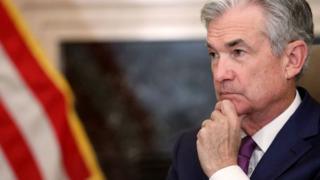Federal Reserve warns of continuing need to protect US economy
 .
.
.
Federal Reserve Chairman Jerome Powell holding a media conference to explain the Fed’s strategy.
The US central bank has repeated its vow to protect the US economy amid rising coronavirus rates and worries about growth.
The Federal Reserve kept interest rates on hold at near zero on Wednesday, saying it would keep them there for as long as necessary.
A Fed statement said there were signs of an economic pick up recently.
But it warned that the long term path of the economy was bound up with the path of the virus.
“Following sharp declines, economic activity and employment have picked up somewhat in recent months but remain well below their levels at the beginning of the year,” policymakers said at the end of their latest two-day meeting.
All members of the Fed’s policy-setting committee voted to leave the target range for short-term interest rates at between 0% and 0.25%, where it has been since 15 March when Covid-19 was starting to take hold in the country.
Republicans introduce $1tn pandemic recovery plan
The millions of Americans ‘hanging by a thread’
“The Committee expects to maintain this target range until it is confident that the economy has weathered recent events and is on track to achieve its maximum employment and price stability goals,” the statement said, adding: “The path of the economy will depend significantly on the course of the virus.”
Economists said the Fed’s stance on interest rates suggests they are unlikely to rise significantly for quite some time.
Gregory Daco, chief US economist at Oxford Economics, said: “We forecast that rate lift-off will not take place until mid-2024 as inflation struggles to reach 2% on a sustained basis and the unemployment rate lags [behind] improvement in the overall economy.”
Bankrate.com’s chief financial analyst Greg McBride said the Fed’s low-rate strategy had kept credit flowing to consumers and businesses, helping to support the housing market and retail spending.
“But they can’t tame the virus or manufacture demand, and that’s what the economy desperately needs in order to bounce back,” he said.




.jpeg?width=682&height=455&name=AdobeStock_295048993%20(1).jpeg)

